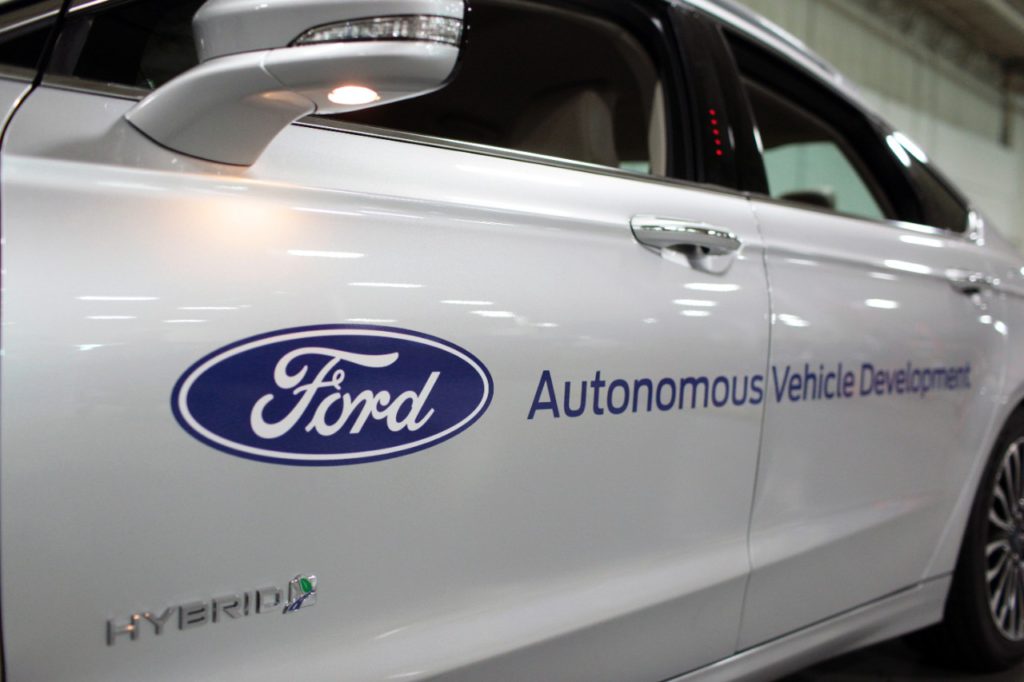Ford forms second in-house R&D team for robotics and artificial intelligence
30 June 2017

30 June 2017
Following on from investing $1 billion (€877 million) in Argo AI, a startup founded by Google and Uber veterans, Ford has formed a second robotics and artificial intelligence (AI) division. With the freeing up of resources by tasking Argo (which includes some Ford staff) with the production of Ford’s first generation autonomous driving system platform, the new division will focus on emerging technologies that will surround this core new field of autonomous driving. This includes looking into new sensor technologies, deep learning methods (a form of AI) and technical requirements for Ford to expand into new markets.
The new division will also go further, by researching personal mobility devices, drone and other aerial robotics to enhance first- and last-mile travel – a long-out emerging field often referred to as ′flying cars‘.
It will also continue to collaborate with Argo AI, so that the Argo team can someday put these emerging technology fields into practice in future generations of self-driving technology. In other words, the new internal Ford AI division, within Ford Research and Advanced Engineering, will be working at the innovation stage, whereas Argo will be working on building these innovations into practical products.
The second separate AI division also means that Ford will be running two separate test fleets, with Argo’s test fleet being for production-level technology, with Ford dedicating its existing research fleet, including at sites such as the University of Michigan’s Mcity test track, for research and trialling new techniques, without disrupting production-level work. This forms part of Ford’s new renewed focus on startups and innovation, including at universities with the University of Michigan’s new Ford Motor Company Robotics Building, to instil a new nimble creative and innovative spirit at the company. As new Ford Chief Technology Officer Ken Washington says in his blog post announcing the new division, Ford now recognises that the professors and students at these universities represent its future.
Following Ford’s replacement of Mark Fields with Jim Hackett as CEO, one of the key areas Ford aimed to change, as executive chairman Bill Ford put it, was that the company had become bogged down in bureaucracy that had slowed decision-making. This meant the company was not leading at a time when revolutions in the industry from self-driving cars to electrification demanded a great deal of innovation to remain competitive into the future.
To this end, Ford’s AI division will also continue to nurture relationships with startups through partnerships, investments and acquisitions. These include its deep established partnerships with Nirenberg Neuroscience (machine vision), Civil Maps and SAIPS (algorithms for computer vision and machine learning).
The size and scale of Ford’s concerted relationships with startups – to the extent of relying on them for their core autonomous programme – is unusual among OEMs, and strongly welcomed. It is also working with robotics startups at its new mobility hub in London. Analysts have long been concerned that carmakers – in their new role as mobility companies – are not willing to nurture startups from the ground up like Silicon Valley tech giants are. This is a vital component of success in emerging new fields, and is a core reason for the success of companies from Google to Apple. If OEMs are to become competitive in emerging fields such as autonomy and connected cars, and truly challenge these tech giants, the nurturing of new talent through startups needs to quickly become part of their core business and central to their DNA.
Ford is leading the way, and other OEMs should follow their example.
Photograph courtesy of Ford
The insight behind the news
Never miss another story – sign up to receive your complimentary Autovista Group Daily Brief. This timely and incisive daily briefing covering automotive news and insights on the issues affecting your business is delivered direct to your inbox.